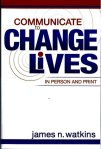Guest post Dr. Peter Lundell

Peter is a writer, pastor, and teacher who helps people connect with God and live by God’s Word and Spirit. With life experience all over the world, he brings new perspectives to what most people overlook. He has authored numerous nonfiction and fiction books on Christian spirituality. Peter is also a collaborative writer, and a developmental and substantive editor. www.PeterLundell.com
If we as believers desire to influence the world we live in, we must make a basic decision. Will we think and act primarily in terms of seeking political change? Or will we think and act primarily in terms of living the Kingdom of God with its political ramifications?
Jesus and the apostles of the New Testament call believers to think, speak, and act as people of the Kingdom of God—rather than get caught up in putting their hope, passion, and focus on politics. They both taught and exemplified this. This didn’t mean taking an easy way out. Quite the opposite. Their actions had huge political consequences and over time generated massive social and political change.
Americans who consider themselves Christian are increasingly reflecting the crowd that stood before Pilate, who to appease the Jews each Passover, would release a prisoner to them. He gave them a choice. They could have Jesus, the Messiah, whose kingdom was “not of this world.” Or they could have Barabbas, who was a freedom fighter and had killed someone, possibly a Roman soldier, during an insurrection against Rome. They did not choose the redeemer of their souls. They wanted more immediate change in a more human and political hope. Barabbas was their man.
When believers look to politics and politicians for their hope, they are little-to-no different from the crowd who rejected Jesus in favor of the guy who represented the political hope they desired. I understand that. It’s natural and normal to be that way. The crowd was influenced by the Pharisees—and we now have news and social media for that—and the crowd was also likely influenced by the devil. But the people in the crowd weren’t evil; they were normal. Like us. And they were swayed.
The North American church faces a crisis in the fact that, increasingly, congregations get more upset about a person’s politics than about heresy. If you doubt that, ask a pastor. Looking at 2000 years of history, as well as the church across the world, I see the lesson that a healthy, impactful church carefully and steadfastly lives above what goes on in the world. That is how they bring the best long-term change to the world.
What does that mean in practical terms? Everything we think and do is rooted in our assumptions, beliefs, and values—whether good or bad, wise or foolish, helpful or unhelpful, godly or ungodly. What are our core assumptions, beliefs, and values—not the “correct” answers but the real ones?
That foundation is singularly important. When we think and act primarily as people of God, whose kingdom, or spiritual reign, is on earth yet is above the things on this earth, we keep our identity and life intact.
But if we drift into prioritizing concerns of this world, we become like the crowd that said, “Give us Barabbas!” We are fooling ourselves, if like them, we think politics is the answer.
Yet following Christ will invariably get political. If our Christ-identity drives us—which does not equal conservatism; it equals the Bible; they’re two different things—our political involvement will be the trailer in proper order of “seek first the Kingdom of Heaven,” and everything else follows. If our politics drive us, then everything gets out of alignment, and Jesus rides in the trailer of our political priorities.
This is not theoretical. The choice is being made in massive numbers across our nation today. We don’t have to answer to politicians, but we will all have to answer to the Master. What will your choice be?























